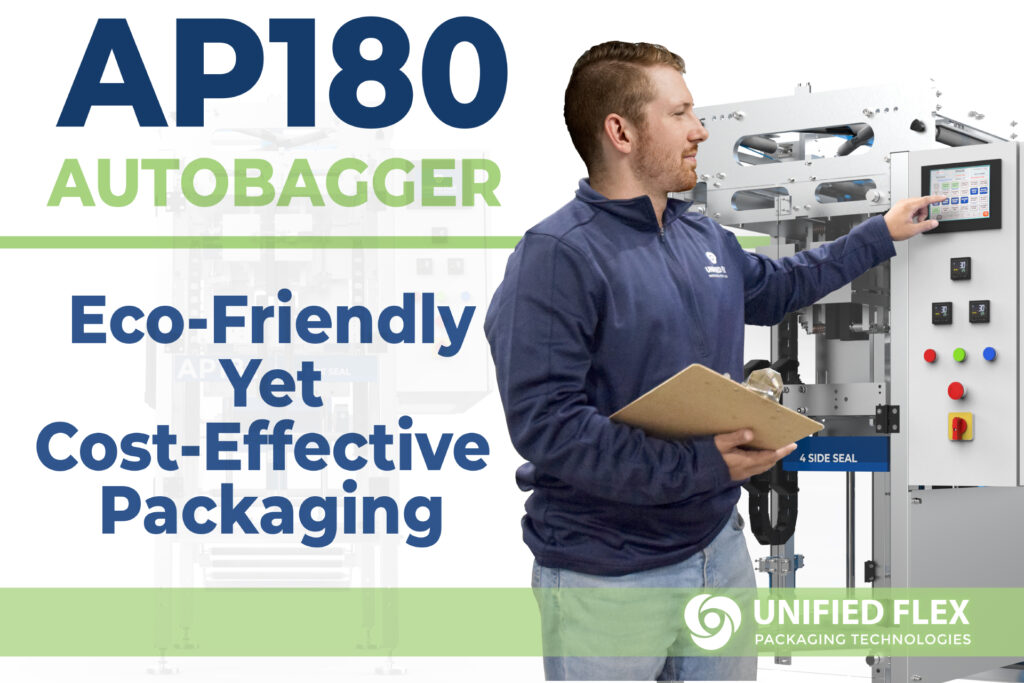Sustainable Packaging for the Future: How the Auto Pouch Bagger AP-180 Reduces Waste and Boosts Efficiency

As the demand for convenient, nutritious, and on-the-go beverages continues to rise, smoothie brands face increasing pressure to streamline packaging, minimize waste, and embrace sustainability. Consumers are more than ever aware of their environmental impact, and they are actively seeking brands that align with their values, favoring packaging that is eco-friendly, efficient, and functional.
At the same time, government regulations on plastic waste and corporate sustainability goals are reshaping how products are packaged and distributed. Traditional smoothie packaging, such as plastic bottles and cartons, is becoming less viable due to high material costs, inefficiencies, and environmental concerns.
For smoothie manufacturers, the challenge is clear: how to meet sustainability expectations while ensuring cost-effective, high-speed production. Enter Unified Flex’s Auto Pouch Bagger AP-180, a solution designed to optimize material usage, reduce waste, and provide a sustainable yet profitable packaging format for smoothie brands.
Let’s explore how this innovative machine is setting new standards for sustainability in the smoothie industry.
The Challenges of Sustainable Packaging in the Smoothie Industry
1. Excessive Material Waste from Bottles and Cartons
Smoothie brands traditionally use plastic bottles or cartons, which contribute significantly to plastic waste and landfill overflow.
Key Issues:
- Overuse of Plastic & Non-Recyclable Materials: Bottles and cartons often contain multiple layers that make them difficult to recycle.
- High Material Costs: Rigid packaging formats require more material and higher production costs.
- Environmental Harm: Single-use plastics from smoothie packaging contribute to pollution and waste.
2. High Energy & Resource Consumption
Smoothie production and distribution require large-scale energy consumption, from packaging production to refrigeration and transportation.
Key Concerns:
- Bulky packaging requires more energy for transportation (heavier loads = higher fuel consumption).
- Cold storage needs increase energy consumption for refrigerated transportation.
- Higher carbon footprints from large plastic containers.
3. The Demand for Eco-Friendly Yet Cost-Effective Packaging
Consumers want smoothies in sustainable, single-serve, and on-the-go formats, but brands struggle to balance sustainability with cost-effective production.
4. Limited Recycling Infrastructure
Many recycling facilities are not equipped to process traditional smoothie packaging, leading to more waste ending up in landfills.
Key Issues:
- Many plastic smoothie bottles are rejected by recycling plants due to mixed material layers.
- Recycling rates for beverage packaging remain low in many regions.
- Lack of access to proper recycling options limits sustainability efforts.
5. Consumer Shift Towards Sustainable Brands
In recent years, consumers have become more conscious about their purchasing decisions. Sustainability is now a key differentiator for brands, with customers willing to pay a premium for products that support eco-friendly initiatives.
Key Trends:
- Increased demand for biodegradable and compostable packaging.
- Brands with strong sustainability commitments enjoy greater customer loyalty.
- Retailers prioritize stocking brands with responsible packaging solutions.
How the Auto Pouch Bagger AP-180 Supports Sustainability Goals in the Smoothie Industry
The Auto Pouch Bagger AP-180 is engineered to address sustainability concerns while maximizing efficiency for smoothie brands. This cutting-edge machine reduces material waste, lowers carbon footprints, and ensures cost-effective manufacturing of smoothie pouches.
1. Reducing Plastic Waste with Flexible Pouches
Unlike traditional plastic bottles or cartons, the AP-180 allows smoothie brands to use flexible pouches that use up to 60% less material.
- Precision form-fill-seal technology minimizes packaging waste.
- Pouches require less plastic than rigid bottles or cartons.
- Lower material costs while maintaining product integrity.
2. Reducing Carbon Footprints in Smoothie Distribution
Because pouches are lightweight and compact, they significantly reduce the carbon footprint associated with shipping and storage.
- More smoothie servings per shipment, reducing transportation fuel use.
- Flexible pouches optimize storage space, cutting warehouse costs.
- Lightweight packaging helps reduce overall carbon emissions.
3. Improving Operational Efficiency & Reducing Product Waste
The AP-180’s automated system ensures that every smoothie pouch is filled precisely, eliminating overfills, reducing product loss, and enhancing portion control.
- Reduces smoothie waste due to accurate filling mechanisms.
- Minimizes human error with automated, consistent operations.
- Ensures high-speed production with reduced downtime.
4. Enhancing Shelf Stability & Consumer Convenience
With secure, high-quality sealing capabilities, the AP-180 extends the shelf life of smoothie pouches, helping to reduce food waste.
- Strong, airtight seals keep smoothies fresh for longer.
- Leak-proof packaging prevents spills and contamination.
- Smoothie sachets meet consumer demand for convenience.
The Competitive Edge for Smoothie Brands
Investing in the AP-180 gives smoothie brands a market advantage by ensuring they stay ahead in sustainability, cost-efficiency, and consumer preference.
- Eco-conscious consumers prefer brands that invest in sustainable packaging.
- Retailers prioritize sustainable packaging options when stocking smoothie products.
- Lower packaging costs translate to higher profit margins for brands.
Innovations in Smoothie Packaging: What’s Next?
With sustainability at the forefront of the smoothie industry, brands are looking toward future innovations in packaging. The AP-180 supports:
- Packaging solutions that minimize waste.
- Packaging films designed for high-barrier protection.
By staying ahead of packaging trends, smoothie brands using the AP-180 will continue to lead in sustainability and innovation.
Final Thoughts: The Future of Smoothie Packaging with AP-180
As the smoothie industry moves toward sustainability and innovation, brands must invest in flexible, eco-friendly packaging solutions to remain competitive. The Auto Pouch Bagger AP-180 has already transformed brands by reducing waste, lowering costs, and meeting evolving regulatory requirements. Now is the time for smoothie businesses to embrace this change and gain a competitive advantage.
The AP-180 offers:
- Optimized material usage to reduce waste.
- Energy-efficient, automated operations to cut costs.
- Lightweight, flexible pouches to minimize carbon footprints.
- Secure, high-quality sealing to enhance smoothie freshness and reduce food waste.
Ready to Make the Switch?
Contact Unified Flex today to discover how the AP-180 can revolutionize your packaging process and support your sustainability goals.
Call us at 1-866-369-4181
Email us at info@unifiedflex.com
Visit us at www.unifiedflex.com
Take the next step toward a more sustainable and profitable future!